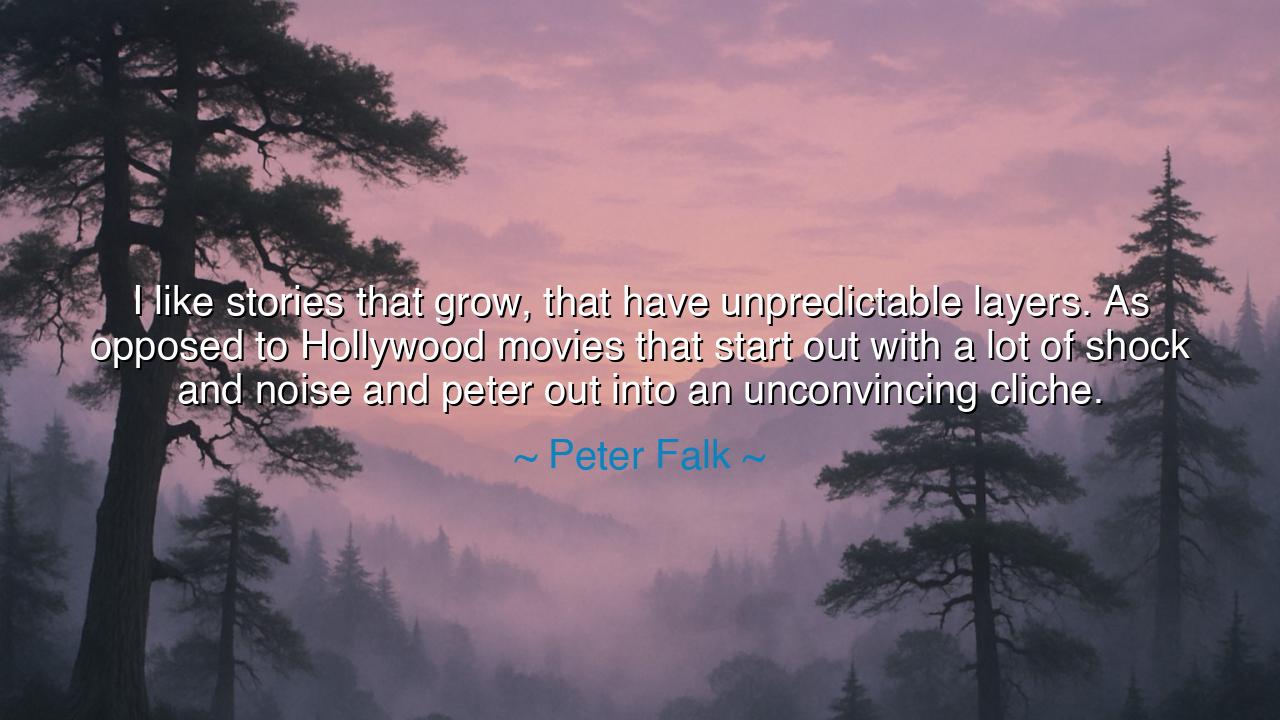
I like stories that grow, that have unpredictable layers. As
I like stories that grow, that have unpredictable layers. As opposed to Hollywood movies that start out with a lot of shock and noise and peter out into an unconvincing cliche.






Peter Falk’s words, "I like stories that grow, that have unpredictable layers. As opposed to Hollywood movies that start out with a lot of shock and noise and peter out into an unconvincing cliché," reflect a deep appreciation for narrative depth and subtlety. Falk is speaking to the nature of stories—how they unfold, how they develop and surprise us with their complexity, much like the stories of old, rather than the quick thrills and shallow resolutions that often characterize contemporary films. Falk’s preference is for stories that offer layers, that reveal truths over time, pulling the audience into a journey that is not just about spectacle but about emotional and intellectual growth.
In the ancient world, the great epics and philosophical dialogues were celebrated not only for their narrative intrigue but for their depth of meaning and the growth they inspired in their readers. Consider the Iliad and the Odyssey, works that are filled with the roar of battle, the uncertainty of fate, and the complicated human emotions of rage, honor, and love. These stories are not simple; they are full of twists and unpredictable turns, where characters like Odysseus and Achilles evolve over time, forced to confront their flaws, their humanity, and the consequences of their actions. The complexity of these ancient stories, much like Falk’s preferred narratives, comes from their ability to reveal deeper layers that only become clear as the story unfolds.
This approach is mirrored in the philosophical dialogues of Plato, especially in works like The Republic. Plato’s Socrates, ever the seeker of wisdom, engages in layered discussions with his interlocutors, questioning assumptions, and peeling back the surface layers of seemingly simple ideas. These dialogues are not driven by shock or noise but by the unpredictable discovery of truth. Socrates leads the reader through a series of revelations, often leaving them with more questions than answers, forcing the audience to engage in deeper contemplation. Falk’s preference for growing stories mirrors this philosophical tradition, where the journey of discovery takes precedence over immediate, shallow rewards.
Falk’s critique of Hollywood films, which he describes as starting with "a lot of shock and noise" only to "peter out into an unconvincing cliché," points to the impermanence of quick, spectacle-driven narratives. Hollywood, with its fast-paced, high-stakes plots, often prioritizes immediate impact over the long-term resonance that comes with genuine emotional growth. This style of storytelling may grab attention momentarily, but it leaves the audience unsatisfied, without the lasting impact of a more thoughtful, layered narrative. It is akin to a storm, which may shake the earth and sky, but soon dissipates, leaving only a fleeting memory. Great stories, like the ancient epics, linger in the mind, changing us with each retelling, as we uncover new meanings and emotions with every engagement.
Consider the story of King Midas, who, in his greed, was granted the ability to turn everything he touched into gold. This gift, initially desired with great fervor, ultimately becomes a curse, as Midas realizes the depth of his folly—unable to eat, drink, or even touch his loved ones. The story of Midas is layered in its exploration of desire, consequence, and the true meaning of wealth. This complexity, this journey of revelation, is what makes the story endure through the ages. Hollywood narratives, in contrast, may offer us the same moral lesson but often in a rushed, predictable manner, robbing us of the time and reflection necessary to fully appreciate the nuances of human experience.
In ancient mythology, stories often carried paradoxes and unanswered questions that forced the listener or reader to wrestle with their own beliefs. Oedipus, the tragic hero who sought to escape his fate, only to fulfill it in the most heartbreaking way, reveals the tragic complexity of free will versus destiny. As the story unfolds, it reveals layers of self-deception, hubris, and inevitability—each layer adding depth to the central question: Can we ever escape our fate? In contrast to the fast-moving, action-packed plots of modern cinema, such timeless tales take us on a journey of discovery, often leaving us with more questions than answers but also with a richer understanding of life’s inherent complexities.
The lesson that Peter Falk offers through his words is one of depth over spectacle. Just as the ancient stories grow and unfold, genuine art—whether in film, literature, or life—should not simply aim to shock or entertain, but to engage deeply with the complexities of the human soul. A good story is not a flash in the pan, but a journey—one that rewards us with insight and growth as it unfolds. The world of entertainment today often seeks to offer immediate gratification, but it is the stories that evolve, that challenge us, that resonate in our hearts, that leave a lasting impact.
In your own life, seek the stories—whether in books, films, or conversations—that are not merely superficial but that ask you to reflect, to grow, and to understand. Do not be drawn into the noise and shock that come with instant gratification, but embrace the journey of discovering layers of meaning and depth. Be patient with the stories and the people you encounter, and allow them to unfold over time, revealing the complexities that make life rich and worth living. Just as in theater or film, true wisdom often comes not from what is immediately obvious, but from what is uncovered only after the story has had time to grow and resonate.






AAdministratorAdministrator
Welcome, honored guests. Please leave a comment, we will respond soon